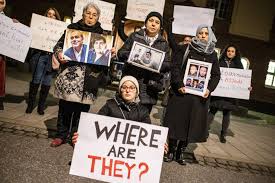The Hague – Syria has failed to comply with an International Court of Justice (ICJ) order issued a year ago to take measures to prevent acts of torture, Human Rights Watch (HRW) reported on November 16. The order, part of a case brought by the Netherlands and Canada, accuses Syria of violating the International Convention against Torture.
HRW’s investigation reveals that Syrians remain at grave risk of enforced disappearances, torture, and inhumane detention conditions, despite the ICJ’s provisional measures. These findings align with reports by other human rights groups and United Nations inquiries documenting ongoing abuses.
“Syrian officials are still sending people to detention centers notorious for torture,” said Balkees Jarrah, Associate Director for International Justice at HRW. “Despite the challenges, Syrian families and survivors are steadfast in their pursuit of justice, whether through the ICJ or other mechanisms.”
Persistent Abuses in Detention
Since the ICJ’s directive, HRW and other organizations have documented widespread violations. The Syrian Network for Human Rights reported the deaths of at least 43 individuals from torture since the court’s order. Meanwhile, the UN Independent International Commission of Inquiry on Syria noted in its latest reports that torture, ill-treatment, and deaths in detention remain prevalent under Syrian state custody.
The UN Special Rapporteur on Torture stated in July 2024 that torture continues to be practiced extensively in Syrian government detention centers. The rapporteur criticized Syria’s inadequate response to inquiries about ongoing violations and failure to implement the ICJ’s order.
Concerns Over Evidence Preservation
The ICJ also directed Syria to preserve evidence related to torture and other prohibited acts. However, activists and international observers have raised concerns that the dissolution of Syria’s Military Field Courts may be an effort to conceal evidence of systemic abuses, including torture.
The case against Syria, filed by Canada and the Netherlands in June 2023, focuses on state responsibility rather than individual accountability. It highlights allegations of unlawful detention, enforced disappearances, gender-based violence, and other forms of torture. Written pleadings from both countries are due by February 2025.
Risks for Refugees and Universal Jurisdiction Efforts
Syrians returning from abroad—whether voluntarily or under coercion—face significant risks, including arbitrary detention and torture. HRW has called on host countries to halt forced returns of Syrian refugees, noting that research contradicts claims by some European governments that parts of Syria are safe for repatriation.
European courts have increasingly recognized universal jurisdiction to hold Syrian authorities accountable for crimes against humanity, offering a rare avenue for justice. Universal jurisdiction permits the prosecution of serious international crimes regardless of where they occurred or the nationality of the perpetrators or victims.
Call to Action
“The past year has only confirmed the Syrian government’s horrific blueprint: detain, disappear, torture, and kill,” Jarrah said. “Governments must use their leverage to ensure Syria complies with the ICJ order and support all efforts to hold perpetrators accountable for ongoing abuses.”
The ICJ’s provisional measures are not a final judgment but serve as a critical step toward addressing Syria’s long-standing violations of international law. The global community now faces mounting pressure to ensure justice and accountability for victims of the Syrian government’s systemic abuses.


